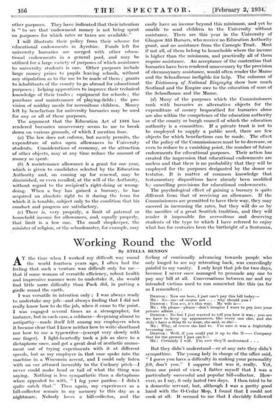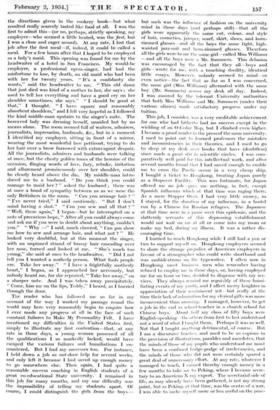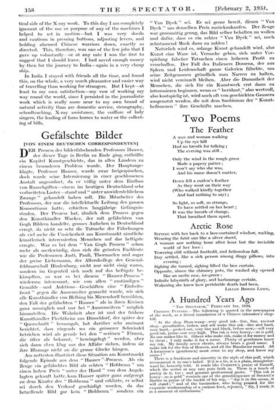Working Round the World
By STELLA BENSON
AT the time when I worked my difficult way round the world fourteen years ago, I often had the feeling that such a venture was difficult only for me— that if some woman of versatile efficiency, robust health and impressive manner were to undertake it, she would find little more difficulty than Puck did, in putting a girdle round the earth.
I was versatile in intention only ; I was always ready to undertake any job—and always finding that -I did not really know how to do the job, when it came to the point. I was engaged several times as a stenographer, for instance, but in each case, a coldness—deepening almost to antipathy—made itself felt among my employers when it became clear that I knew neither how to write shorthand nor how to use a typewriter—(except very slowly with one finger). I light-heartedly took a job as slave to a dietaphone once, and got a great deal of aesthetic amuse- ment out of trying experiments with it at different speeds, but as my employer in that case spoke into the machine in a Wisconsin accent, and I could only- listen with an car attuned incurably to the Cockney pitch—I never could make head or tail of what the thing was saying. Nothing is less sympathetic than a dictaphone when appealed to with, "I beg your pardon—I didn't quite catch that." Then again, my experiences as a bill-collector remain in my memory to this day as - a nightmare. Nobody loves a • bill-colleetori and the' feeling of continually advancing towards people who only longed to see my retreating back, was exceedingly painful to my vanity. I only kept that job for two days,. because I. never once managed to persuade any one to pay any bill at all. Conversations between me and my intended victims used to run somewhat like this (as far as I remember) : DEBTOR NOW see here, I just can't pay this bill today—
ME : No—no—of course not . . . why should you ?
DEBTOR: You see, it's this way. My wife is—
ME : Oh please—please—don't imagine I want to pry into your private affairs . . .
DEBTOR: No but I just wanted to tell you how it was ; you see we have to keep up appearances, like every one else, and she
didn't have a thing fit to wear, she said, so she— ME: Why, of course she had to. I'm sure it was a frightfully
becoming one.
DEBTOR: Well, if you could put it up to the N-- Company
that for the present I ',List can't—
ME : Certainly I will. I'm sure they'll understand , . .
But they didn't understand—or at any rate they didn't sympathize. The young lady in charge of the office said, "I guess you have a difficulty in makingyour personality felt, don't you." I suppose that was it, 'really. Yet, from one point of view, I flatter myself that I was a particularly successful and popular bill-collector. How- ever, as I say, it only lasted two days. I then tried to be a domestic servant, but, although I was a pretty good hand with the 0-Cedar Mop, I found that could not cook at all: It seemed to me that I slavishly followed' the directions given in the cookery book—but what resulted really scarcely tasted like food at all. I was the first to admit this—(or no, perhaps, strictly speaking, my employer—who seemed a little heated, was the first, but I was a close and eager second). At any rate, I lost that job after the first meal—if, indeed, it could be called a meal. For a few hours after that I hoped to be employed as a lady's maid. This opening was found for me by the headwaiter of a hotel in San Francisco. My would-be employer, a professional opera-singer, had had the misfortune to lose, by death, an old maid who had been with her for twenty years. "It's a confidanty she wants," said the headwaiter to me. "This old dame that just died was kind of a mother to her, she says ; she used to tell her everything and have a_ good cry on her shoulder sometimes, she says." " I should be good at that," I thought. , "I have square and reasonably absorbent shoulders," and I felt very hopeful as I followed the kind middle-man upstairs to the singer's suite. The bereaved lady was dressing herself, unaided but by no means alone. The room seemed full of waiters, admirers, journalists, impresarios, husbands, &c., but in a moment I identified my employer, sitting in front of a mirror, wearing the most wonderful lace petticoat, trying to do her hair over a brow furrowed with extravagant despair. All the journalists, admirers and husbands were talking at once, but the chesty golden tones of the heroine of the occasion, flinging words of love, fury, rebuke, irritation and allurement promiscuously over her shoulder, could be clearly heard above the din. My middle-man intro- duced me to a husband. "Do you think you could manage to maid her ? " asked the husband ; there was at once a bond of sympathy between us as we were the only Britishers in the room. "Can you arrange hair ? " "I've never tried," I said cautiously. "But I don't mind having a shot." "Can you sew and all that ? " "Well, there again," I began—but he interrupted on a note of precarious hope, "After all you could always come and ask me if you were in doubt about anything, couldn't you." "Why —" I said, much cheered, "Can you show me how to sew and arrange hair, and what not ? " He looked very doubtful, but at this moment the singer, with an unpinned strand of brassy hair cascading over her nose, turned and looked at me. "She's much too young," she said at once to the headwaiter. "Did I not tell you I wanted a motherly person. What fools people are. Take her away." "I have a frightfully motherly heart," I began, as I approached her nervously, but nobody heard me, for she repeated, "Take her away," on a sharper note. And I was taken away precipitately. "Come, kiss me on the lips, Teddy," I heard, as I hurried through the door.
The reader who has followed me so far in my account of the way I worked my passage round the world may here very reasonably begin to enquire how I ever made any progress at all in the face of such constant failures to Make My Personality Felt. I have mentioned my difficulties in the United States first, simply to illustrate my first contention—that, at any rate in those days, a young woman possessed of all the qualifications I so markedly lacked, would have escaped the various failures and humiliations I en- countered. But I had my successes too. For instance, I held down a job as out-door help for several weeks, and only left it because I had saved up enough money to go somewhere else. Then again, I had quite a reasonable success coaching in English students of a great co-educational State university. I remained in this job for many months, and my one difficulty was the impossibility of telling my students apart. Of - course, I could distinguish- the girls from the boys— but such was the influence of fashion on the universit3 mind in those days (and perhaps still)—that all the girls wore _apparently the same cut, colour, and style of hair, cosmetics, jumper, scarf, skirt, shoes, and horn rimmed glasses—and all the boys the same tight, high- waisted jazz-snit and horn-rimmed glasses. Therefore all the girls were to me the same girl—called Miss Williams —and all the boys were a Mr. Summers. This delusion was encouraged by the fact that they all—boys and girls—wrote for me, with a touching docility, identical little essays. However, nobody seemed to mind—or even notice-7-the fact that as far as I was concerned, the same girl (Miss Williams) alternated with the same boy (Mr. Summers) across my desk all day. Indeed, I was assured by the tolerant University authorities that both Miss Williams and. Mr. Summers (under their various aliases) made satisfactory progress under my tuition.
This job, I consider, was a very creditable achievement for one who had hitherto had no success except in the wielding of an 0-Cedar Mop, but I climbed even higher. I became a, proof-reader in the press of the same university. I used to point out to learned professors the mistakes and inconsistencies in their theories, and I used to go to sleep at my desk over books that have (doubtless) since made a great. stir in scientific circles. I was com- paratively well paid for this intellectual work, and after several months found that I had saved enough to enable me to cross the Pacific ocean in a very cheap ship. I bought a ticket to Hongkong, treating Japan ,purely as a Stopover Facility. This was fortunate, for Japan offered me no job—gave me nothing, in fact, except Spanish influenza which at that time was raging there.. As a mere Stopper Over, I had very little money, so I stayed, for the duration of my influenza, in a hostel run by a Chinese for Russian refugees. The Japanese at that time were in a panic over this epidemic, and the slatternly servants of this depressing establishment would not wait on me at all or conic into my room or make my bed, during my illness. It was a rather dis- couraging time.
I hurried to reach Hongkong while I still had a yen or two to support myself on. Hongkong employers seemed to share the strange prejudice of American employers in favour of a stenographer who could write shorthand and was ambidextrous on the typewriter. I often now in Hongkong meet business men who remember having refused to emplii■,, nit in those days, or, having employed me for an hour or two, decided to dispense with my ser- vices. They always remind me roguishly of these humi- liating events of my youth, and I affect merry laughter in appreciation of their reminiscent wit—but really at the time their lack of adniirat ion for my clerical gifts was more inconvenient than amusing. I managed, however, to get a job in the end as school-teacher in a church school for Chinese boys. About half my class of fifty boys were English-speaking—the of hers from first to last understood not a word of what I taught them. Perhaps it was as well. Not that I taught anything detrimental, of course. But I am a discursive teacher, and used to be so copious in the provision of illustrations, parables and anecdotes, that the minds of those of my pupils who understood me must have been Ist. confused hodge-podge of irrelevancies, and the minds of those who (lid not were certainly spared a great deal of unnecessary effort. At any rate, whatever I managed to teach, I earned thereby enough money in a few months to take me to Peking, where I became secre- tary to an American X-ray expert. The secretarial side of life, as may already have been gathered, is not my strong point, but as Peking, at that time, was the centre of a war, I was able to make myself more or less useful on the prac- tical side of the X-ray work. To this day I am completely ignorant of the use or purpose of any of the machines I helped to set in motion—but I was very docile and cautious in pressing buttons, adjusting levers, and holding alarmed Chinese warriors down, exactly as directed. This, therefore, was one of the few jobs that I gave up voluntarily—or at any rate I was the first to suggest that I should leave. I had saved enough money by then for the journey to India—again in a very cheap ship.
In India I stayed with friends all the time, and found this, on the whole, a very much pleasanter and easier way of travelling than working for strangers. But I kept—at least to my own satisfaction—my vow of working my way round the world, since I persisted in the journalistic work which is really more near to my own brand of natural activity than are domestic service, stenography, schoolteaching, X-ray assistance, the coiffure of lady singers, the leading of farm horses to water or the collect- ing of bills.










































 Previous page
Previous page